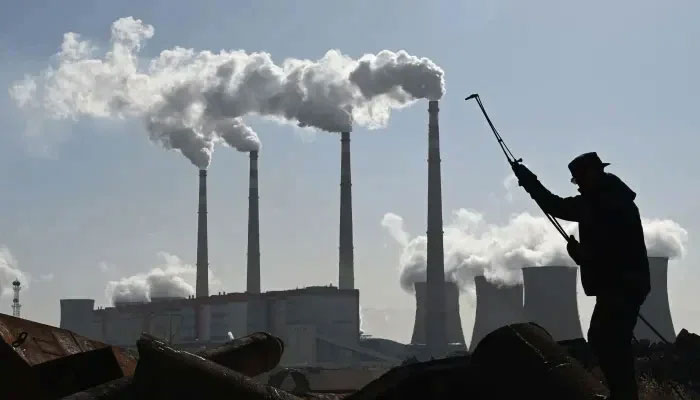Carbon emission issue behind financial constraints: official
KARACHI: Local banks have shown little interest in financing the ‘gasification of Thar coal’ project, posing significant challenges to its realization, The News learnt on Wednesday.
The project, originally announced nearly a decade ago under the supervision of nuclear scientist Dr Samar Mubarakmand, has yet to materialize. Recently, Prime Minister Shehbaz Sharif called for strategizing Thar coal gasification as a solution to gas shortages and high import costs.
According to sources from the banking sector and the Sindh government, obtaining financing for the project remains a daunting task, exacerbated by climate concerns and the pervasive circular debt issues in the power sector. Banks are now reluctant to extend financing because of these issues.
Chief Minister Sindh Syed Murad Ali Shah recently highlighted these challenges in communications with federal finance and power authorities, as well as the governor of the State Bank of Pakistan.
Sources within the Sindh government expressed pessimism regarding future financing prospects, attributing banks’ reluctance to concerns over carbon emissions and the financial risks associated with power plant investments, which contribute to circular debt accumulation.
“Gasification of Thar coal is also among the projects, which couldn’t attract financing in the past and finds it hard to fetch it in the future as well due to banks’ reluctance,” the sources said.
They cited the climate issue as one of the reasons, along with the risky business of power plants, for the piling up of circular debt, leading towards a financial crunch. In his comments to The News, Managing Director of the Thar Coal Energy Board (TCEB) Tariq Ali Shah acknowledged the financing hurdles despite the chief minister’s efforts.
“Yes, the carbon emission issue is one of the reasons for financial constraints for Thar projects, including gasification of Thar coal, he added, emphasizing that Pakistan’s carbon footprint is not a major deterrent for coal projects. He said that the country’s carbon footprint is not so big that coal projects are being denied financing.
Sources in the banking sector pointed out that internally, banks do not finance coal projects, which adversely pollute the environment. Although banks in Pakistan are not fully following global trends, there is realization that financing carbon-emission projects should be discouraged. They pointed out that apart from the climate issue, circular debt in the power sector has been creating hurdles as the power sector finds it hard to work financially due to non-payment from various sectors and government departments.
Energy-deficient Pakistan is struggling to rely on local fuel for its energy needs, and Thar coal is considered a cheap fuel. However, environmental degradation from coal has also been a source of concerns in the country, and NGOs working in the sector as well as the local community in Thar have been raising voices against Thar coal’s environmental aspects.
Recently, a conference raised social and environmental concerns over what it called a coal-induced water crisis in Thar, severely affecting the lives and livelihoods of local communities, and demanded the government of Sindh establish a broad-based water commission, institute a participatory environmental monitoring mechanism, and adopt inclusive processes for mitigating the risks that coal power projects pose to groundwater resources in Thar.
-
 Hong Kong Court Sentences Media Tycoon Jimmy Lai To 20-years: Full List Of Charges Explained
Hong Kong Court Sentences Media Tycoon Jimmy Lai To 20-years: Full List Of Charges Explained -
 Coffee Reduces Cancer Risk, Research Suggests
Coffee Reduces Cancer Risk, Research Suggests -
 Katie Price Defends Marriage To Lee Andrews After Receiving Multiple Warnings
Katie Price Defends Marriage To Lee Andrews After Receiving Multiple Warnings -
 Seahawks Super Bowl Victory Parade 2026: Schedule, Route & Seattle Celebration Plans
Seahawks Super Bowl Victory Parade 2026: Schedule, Route & Seattle Celebration Plans -
 Keto Diet Emerges As Key To Alzheimer's Cure
Keto Diet Emerges As Key To Alzheimer's Cure -
 Chris Brown Reacts To Bad Bunny's Super Bowl LX Halftime Performance
Chris Brown Reacts To Bad Bunny's Super Bowl LX Halftime Performance -
 Trump Passes Verdict On Bad Bunny’s Super Bowl Halftime Show
Trump Passes Verdict On Bad Bunny’s Super Bowl Halftime Show -
 Super Bowl 2026 Live: Seahawks Defeat Patriots 29-13 To Win Super Bowl LX
Super Bowl 2026 Live: Seahawks Defeat Patriots 29-13 To Win Super Bowl LX -
 Kim Kardashian And Lewis Hamilton Make First Public Appearance As A Couple At Super Bowl 2026
Kim Kardashian And Lewis Hamilton Make First Public Appearance As A Couple At Super Bowl 2026 -
 Romeo And Cruz Beckham Subtly Roast Brooklyn With New Family Tattoos
Romeo And Cruz Beckham Subtly Roast Brooklyn With New Family Tattoos -
 Meghan Markle Called Out For Unturthful Comment About Queen Curtsy
Meghan Markle Called Out For Unturthful Comment About Queen Curtsy -
 Bad Bunny Headlines Super Bowl With Hits, Dancers And Celebrity Guests
Bad Bunny Headlines Super Bowl With Hits, Dancers And Celebrity Guests -
 Insiders Weigh In On Kim Kardashian And Lewis Hamilton's Relationship
Insiders Weigh In On Kim Kardashian And Lewis Hamilton's Relationship -
 Prince William, Kate Middleton Private Time At Posh French Location Laid Bare
Prince William, Kate Middleton Private Time At Posh French Location Laid Bare -
 Stefon Diggs Family Explained: How Many Children The Patriots Star Has And With Whom
Stefon Diggs Family Explained: How Many Children The Patriots Star Has And With Whom -
 ‘Narcissist’ Andrew Still Feels ‘invincible’ After Exile
‘Narcissist’ Andrew Still Feels ‘invincible’ After Exile




